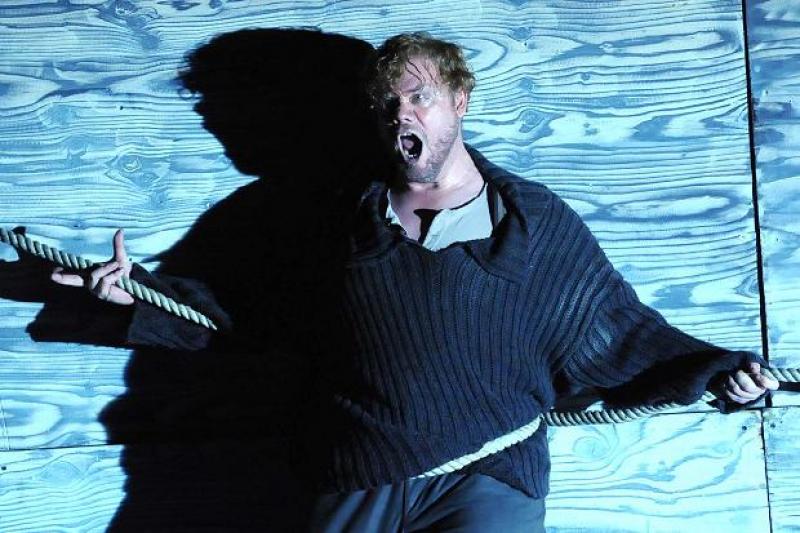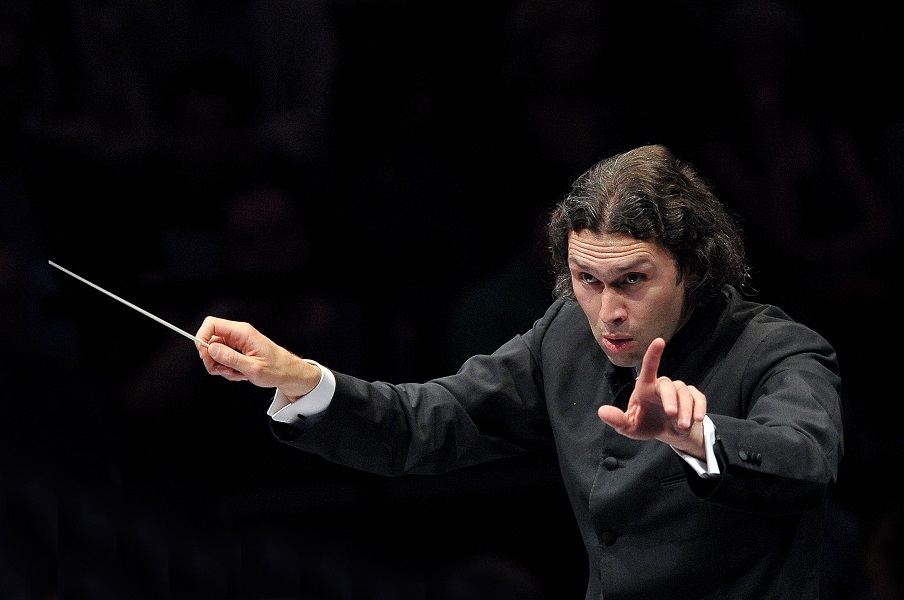Peter Grimes, LPO, Jurowski, Royal Festival Hall | reviews, news & interviews
Peter Grimes, LPO, Jurowski, Royal Festival Hall
Peter Grimes, LPO, Jurowski, Royal Festival Hall
Tenor, conductor and orchestra sear in Britten's seminal masterpiece

For Londoners unable to travel up to Aldeburgh – or, now, to Leeds for the revival of Phyllida Lloyd’s Opera North production – this was the only chance in Britten centenary year to be blitzed by his seminal masterpiece.
Yet there were other virtues; given today’s most accomplished interpreter of the violent-visionary fisherman, Stuart Skelton, and a conductor in Vladimir Jurowski always poised hawk-like to claw revelatory new detail from the score, the musical performance was still as unforgettable as they come.
Skelton gives an heroic-tenor Grimes, currently alternating in equal heroism or foolhardiness with his Florestan at English National Opera. That means gains in the elemental force and a few losses in subtler tone colours – though he has refined his musical reading enormously since the 2009 ENO performances. You might have been inclined to weep – I was – at his very first not-all-there echoes of the coroner’s oath-reading in the inquest for the suspicious death of his young apprentice. I was also moved to tears, in the pub on the night of the storm, less at the rapt solo of “Now the great bear”, where others have lit up more hauntingly the sustained high E which was creator Peter Pears’ money note, than at Grimes going mad with the edgy release of the manic round "Old Joe has gone fishing" (magnificently dispatched by the ensemble here).
 The monologue in Grimes’ hut, constructed in Alex Doidge-Green’s designs evocatively but a touch distantly on the left of the platform above the orchestra, suggested less of the schizoid than the late and peerless Philip Langridge’s manner, and despite the ludicrously overdone programme biography’s insistence on Skelton's "beautiful voice" – agents’ blurbs need serious editing – there’s less tonal caressing than we once got, earlier in his career, from fellow heldentenor Ben Heppner. But there’s no-one around now to give a more vivid account of this difficult and harrowing role.
The monologue in Grimes’ hut, constructed in Alex Doidge-Green’s designs evocatively but a touch distantly on the left of the platform above the orchestra, suggested less of the schizoid than the late and peerless Philip Langridge’s manner, and despite the ludicrously overdone programme biography’s insistence on Skelton's "beautiful voice" – agents’ blurbs need serious editing – there’s less tonal caressing than we once got, earlier in his career, from fellow heldentenor Ben Heppner. But there’s no-one around now to give a more vivid account of this difficult and harrowing role.
Jurowski (pictured above by Chris Christodoulou) applied to the music's twists and turns a neat but lethal surgical knife rather than Kafka’s famous image of great art’s ice-axe through the frozen sea. His approach went for whiplash intensity, avoiding the deep waters previously charted by Mark Wigglesworth at Glyndebourne – a reading which time has vindicated on a CD archive release – or Haitink at the Royal Opera, at least until we reached a crucial Passacaglia variation at the heart of the opera. This and the other interlude not included in the concert-hall group of four, pre-empting Grimes’s mad scene in the fog, blinded us with magnesium-flare projections of Britten’s sparest sounds, London Philharmonic strings lean and hungry.
American soprano Pamela Armstrong, a vivacious Rosalinde in Jurowski’s Glyndebourne Fledermaus, sobered up as sympathetic widow Ellen Orford and in spite of an occasionally frayed upper register, brought real artistry to the role, rising to the expressive challenges of the great “Embroidery Aria”. A year and a half off 70, Alan Opie remains in good voice as the Balstrode of choice, and among a strong mostly-British supporting cast Mark Stone projected every word with meaty baritone sound as jack-the-lad apothecary Ned Keene.
So much of the right atmosphere was there, and never more so than in Tim Mascall’s lights on the new Festival Hall organ's glitter-of-waves pipes
From my seat far back, not everything could be heard from veteran Jean Rigby’s Mrs Sedley and Pamela Helen Stephen’s pub-brothel landlady – strong characterizations both, and while perhaps you really need an old-bag mezzo for the buttoned-up laudanum addict, there’s no reason why “Auntie” shouldn’t be an attractive woman: the bright tops sported by her and her "nieces" – Malin Christensson and Elizabeth Cragg, excellent in the Straussian quartet - suggested that they alone bring colour to the Borough.
Apart from the highlighted infelicities in Montagu Slater's text - though there are strong lines too, its missed lobs at high-flown poetry were emphasised by having re-appreciated Auden's libretto for Paul Bunyan only a couple of weeks earlier - the only shame was on a professional choir, the London Voices, for uneasily sporting scores, not allowed in the Proms Wagner. 20 more voices would have given us the sea-wall of sound we needed at feral climaxes. Otherwise so much of the right atmosphere was there, and never more so than in Tim Mascall’s lights on the new Festival Hall organ's glitter-of-waves pipes. What a handsome performing space this now is, enhanced by Slater D’s semi-staging, and I can’t wait to hear those pipes in action.
rating
Share this article
Add comment
The future of Arts Journalism
You can stop theartsdesk.com closing!
We urgently need financing to survive. Our fundraising drive has thus far raised £49,000 but we need to reach £100,000 or we will be forced to close. Please contribute here: https://gofund.me/c3f6033d
And if you can forward this information to anyone who might assist, we’d be grateful.

Subscribe to theartsdesk.com
Thank you for continuing to read our work on theartsdesk.com. For unlimited access to every article in its entirety, including our archive of more than 15,000 pieces, we're asking for £5 per month or £40 per year. We feel it's a very good deal, and hope you do too.
To take a subscription now simply click here.
And if you're looking for that extra gift for a friend or family member, why not treat them to a theartsdesk.com gift subscription?
more Opera
 La bohème, Opera North review - still young at 32
Love and separation, ecstasy and heartbreak, in masterfully updated Puccini
La bohème, Opera North review - still young at 32
Love and separation, ecstasy and heartbreak, in masterfully updated Puccini
 Albert Herring, English National Opera review - a great comedy with depths fully realised
Britten’s delight was never made for the Coliseum, but it works on its first outing there
Albert Herring, English National Opera review - a great comedy with depths fully realised
Britten’s delight was never made for the Coliseum, but it works on its first outing there
 Carmen, English National Opera review - not quite dangerous
Hopes for Niamh O’Sullivan only partly fulfilled, though much good singing throughout
Carmen, English National Opera review - not quite dangerous
Hopes for Niamh O’Sullivan only partly fulfilled, though much good singing throughout
 Giustino, Linbury Theatre review - a stylish account of a slight opera
Gods, mortals and monsters do battle in Handel's charming drama
Giustino, Linbury Theatre review - a stylish account of a slight opera
Gods, mortals and monsters do battle in Handel's charming drama
 Susanna, Opera North review - hybrid staging of a Handel oratorio
Dance and signing complement outstanding singing in a story of virtue rewarded
Susanna, Opera North review - hybrid staging of a Handel oratorio
Dance and signing complement outstanding singing in a story of virtue rewarded
 Ariodante, Opéra Garnier, Paris review - a blast of Baroque beauty
A near-perfect night at the opera
Ariodante, Opéra Garnier, Paris review - a blast of Baroque beauty
A near-perfect night at the opera
 Cinderella/La Cenerentola, English National Opera review - the truth behind the tinsel
Appealing performances cut through hyperactive stagecraft
Cinderella/La Cenerentola, English National Opera review - the truth behind the tinsel
Appealing performances cut through hyperactive stagecraft
 Tosca, Royal Opera review - Ailyn Pérez steps in as the most vivid of divas
Jakub Hrůša’s multicoloured Puccini last night found a soprano to match
Tosca, Royal Opera review - Ailyn Pérez steps in as the most vivid of divas
Jakub Hrůša’s multicoloured Puccini last night found a soprano to match
 Tosca, Welsh National Opera review - a great company reduced to brilliance
The old warhorse made special by the basics
Tosca, Welsh National Opera review - a great company reduced to brilliance
The old warhorse made special by the basics
 BBC Proms: The Marriage of Figaro, Glyndebourne Festival review - merriment and menace
Strong Proms transfer for a robust and affecting show
BBC Proms: The Marriage of Figaro, Glyndebourne Festival review - merriment and menace
Strong Proms transfer for a robust and affecting show
 BBC Proms: Suor Angelica, LSO, Pappano review - earthly passion, heavenly grief
A Sister to remember blesses Puccini's convent tragedy
BBC Proms: Suor Angelica, LSO, Pappano review - earthly passion, heavenly grief
A Sister to remember blesses Puccini's convent tragedy
 Orpheus and Eurydice, Opera Queensland/SCO, Edinburgh International Festival 2025 review - dazzling, but distracting
Eye-popping acrobatics don’t always assist in Gluck’s quest for operatic truth
Orpheus and Eurydice, Opera Queensland/SCO, Edinburgh International Festival 2025 review - dazzling, but distracting
Eye-popping acrobatics don’t always assist in Gluck’s quest for operatic truth

Comments
Well David, had you checked
I checked my diary, thank
I checked my diary, thank you, waldteufel, and I'm well aware that Birmingham has a far superior hall, but sadly budgets do not stretch. I know at least one national critic was there for the Grimes in Brum, but presumably didn't stay on for the Manfred (which of course Jurowski also does superbly). I'm guessing given Nelsons' association with Orfeo it will appear on CD. Second best, I know, but better than nothing.
Indeed it was recorded by
Actually, as DN noted, at
To be fair, I think
To be fair, I think waldteufel was referring specifically to the Manfred performance. Anyway, bit of hyperbole in that review, I feel. 40 years of memory should include, recently, Edward Gardner who had never conducted anything better at ENO. I mention Wigglesworth too, whose Grimes, Anthony Dean Griffey, sounds on the recording as if he's up there with the greats (such howling and unearthliness, both things Skelton doesn't do). And 40 years also includes Langridge, whom no-one in my memory has ever surpassed, and probably never will.
Indeed, I was referring to
Of course, no singer can
Of course, no singer can achieve everything potential in any given role, and Skelton brings things to Grimes unknown even to Vickers. But we do have films as well as recordings of both Pears and Langridge. Let's just say that the edge of intensity combined with the cut and anguish in the voice in the latter DO make him unique. In my books. Ditto his Vere.